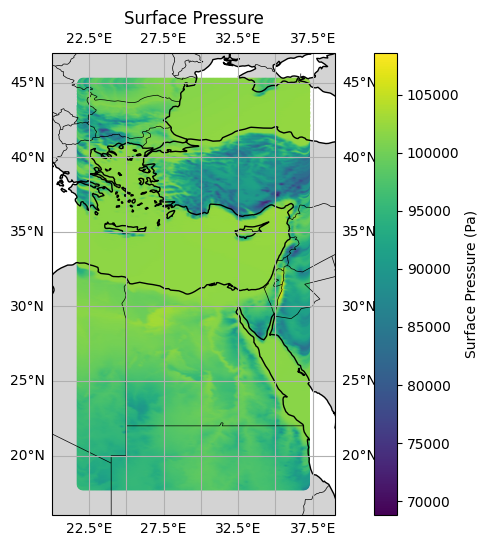DEDT Lumi through ECMWF Polytope API#
The EMCWF Polytope API now supports bespoke geometry definions in queries.
eodag supports this feature via de geom parameter for the dedt_lumi provider.
[1]:
from eodag import EODataAccessGateway
import json
dag = EODataAccessGateway()
result = dag.search(
provider="dedt_lumi",
start="2021-01-01",
productType="DT_CLIMATE_ADAPTATION",
geom={'lonmin': 22, 'latmin': 18, 'lonmax': 37, 'latmax': 45},
)
result
[1]:
| SearchResult (1) | ||||||||||||||||||||||||||||||||||||||||||||||||||||||||||||||||||||||||||
0 EOProduct(id=DT_CLIMATE_ADAPTATION_ORDERABLE_c9ed022bda4820372d1eda2f3105d47a8a6396ad, provider=dedt_lumi)
|
Let’s download this product and check its data.
[2]:
path = result[0].download(output_dir='/tmp')
!tree {path}
[Retry #7] Waiting 11.595347s until next order status check (retry every 0.2' for 10')
/tmp/DT_CLIMATE_ADAPTATION_a6764da7-9c5c-472d-a884-e965d127423f
└── DT_CLIMATE_ADAPTATION_a6764da7-9c5c-472d-a884-e965d127423f.covjson
1 directory, 1 file
When requesting a RoI, ECMWF Polytope will generate a covjson file.
To plot it, we are going to load it into an xarray dataset.
[3]:
import os
import json
from covjsonkit.api import Covjsonkit
import matplotlib.pyplot as plt
import cartopy.crs as ccrs
import cartopy.feature as cfeature
cov_json_path = os.path.join(path, os.listdir(path)[0])
with open(cov_json_path) as f:
covjson = json.load(f)
# Load CovJson using covjsonkit into an xarray
decoder = Covjsonkit().decode(covjson)
ds = decoder.to_xarray()
ds
[3]:
<xarray.Dataset> Size: 6MB
Dimensions: (datetimes: 1, number: 1, steps: 1, points: 104351)
Coordinates:
* datetimes (datetimes) <U20 80B '2021-01-01 00:00:00Z'
* number (number) int64 8B 0
* steps (steps) int64 8B 0
* points (points) int64 835kB 0 1 2 3 4 ... 104347 104348 104349 104350
latitude (points) float64 835kB 18.01 18.01 18.01 ... 44.99 44.99 44.99
longitude (points) float64 835kB 22.06 22.15 22.24 ... 36.8 36.89 36.98
levelist (points) float64 835kB 0.0 0.0 0.0 0.0 0.0 ... 0.0 0.0 0.0 0.0
Data variables:
sp (datetimes, number, steps, points) float64 835kB 9.549e+04 ......
10u (datetimes, number, steps, points) float64 835kB -5.133 ... 4.259
10v (datetimes, number, steps, points) float64 835kB -0.9033 ... 8...
Attributes: (12/15)
activity: scenariomip
class: d1
dataset: climate-dt
experiment: ssp3-7.0
expver: 0001
generation: 1
... ...
resolution: high
stream: clte
type: fc
number: 0
step: 0
date: 2021-01-01 00:00:00Z[4]:
# Extracting sp variable from dataset
# Data in the original covjson is organize in points rather than lat/lon variables
# so we plot as scatter.
sp = ds['sp'].isel(datetimes=0, number=0, steps=0).values
lats = ds['latitude'].values
lons = ds['longitude'].values
fig = plt.figure(figsize=(10,6))
ax = plt.axes(projection=ccrs.PlateCarree())
# Add features
ax.coastlines()
ax.gridlines(draw_labels=True)
ax.add_feature(cfeature.BORDERS, linewidth=0.5)
ax.add_feature(cfeature.LAND, facecolor='lightgray')
sc = ax.scatter(lons, lats, c=sp, s=40, cmap='viridis',
transform=ccrs.PlateCarree())
plt.colorbar(sc, orientation='vertical', label='Surface Pressure (Pa)')
margin = 2
ax.set_extent([
lons.min()-margin, lons.max()+margin,
lats.min()-margin, lats.max()+margin
], crs=ccrs.PlateCarree())
plt.title("Surface Pressure")
plt.show()


